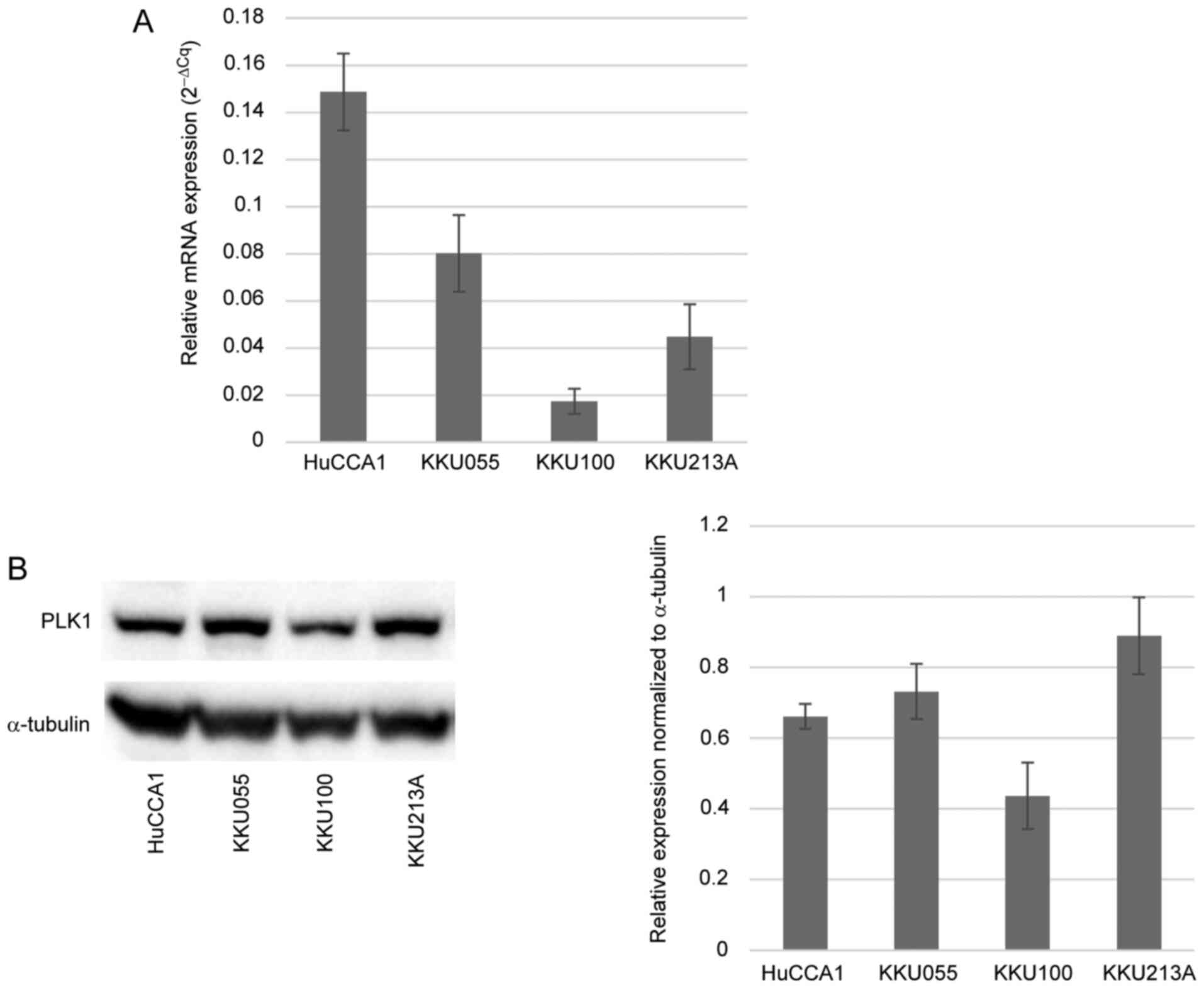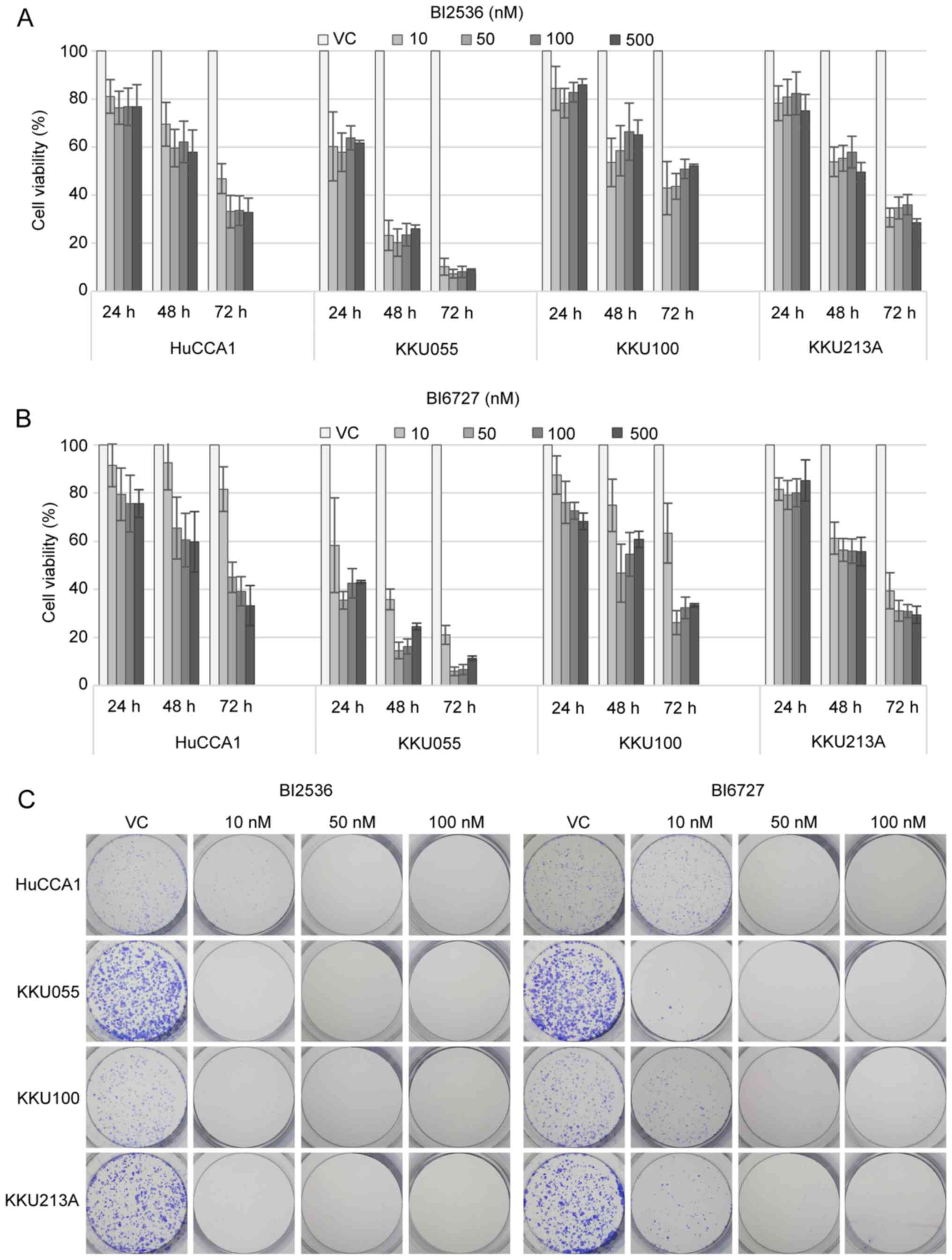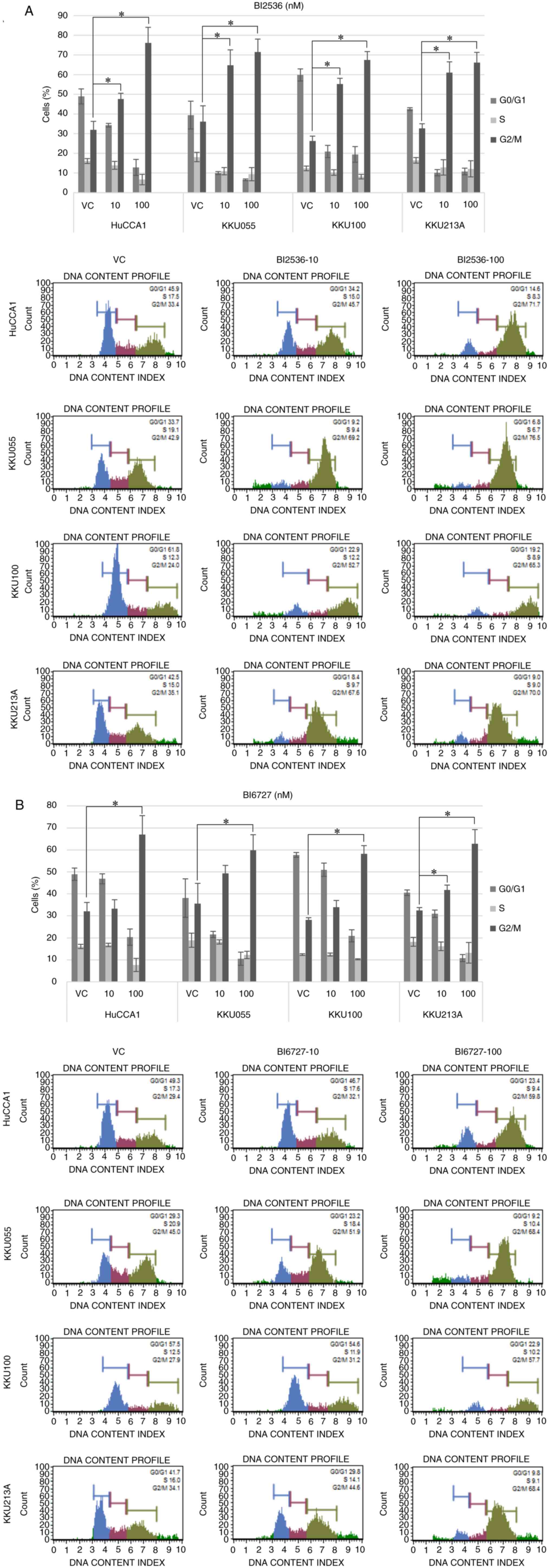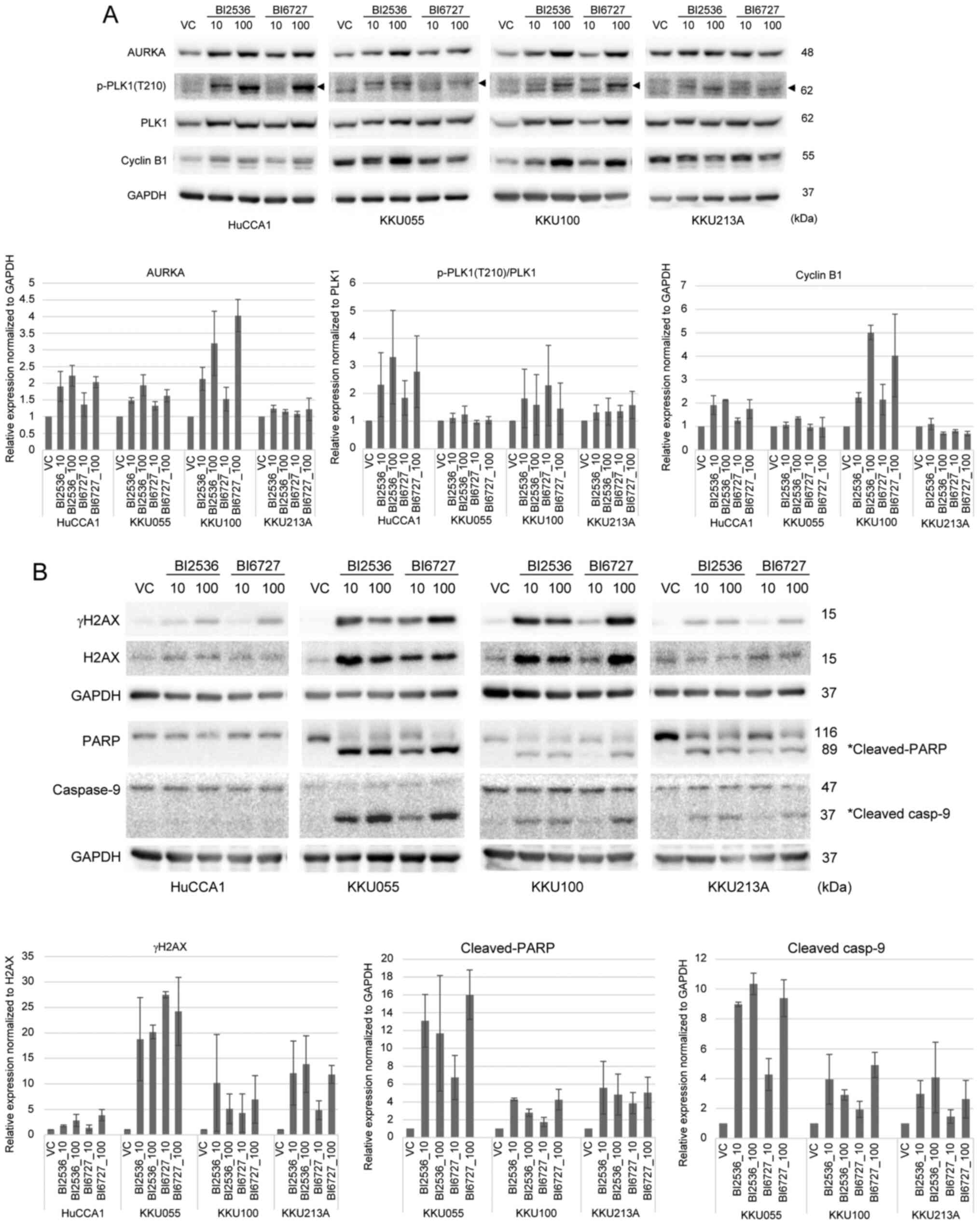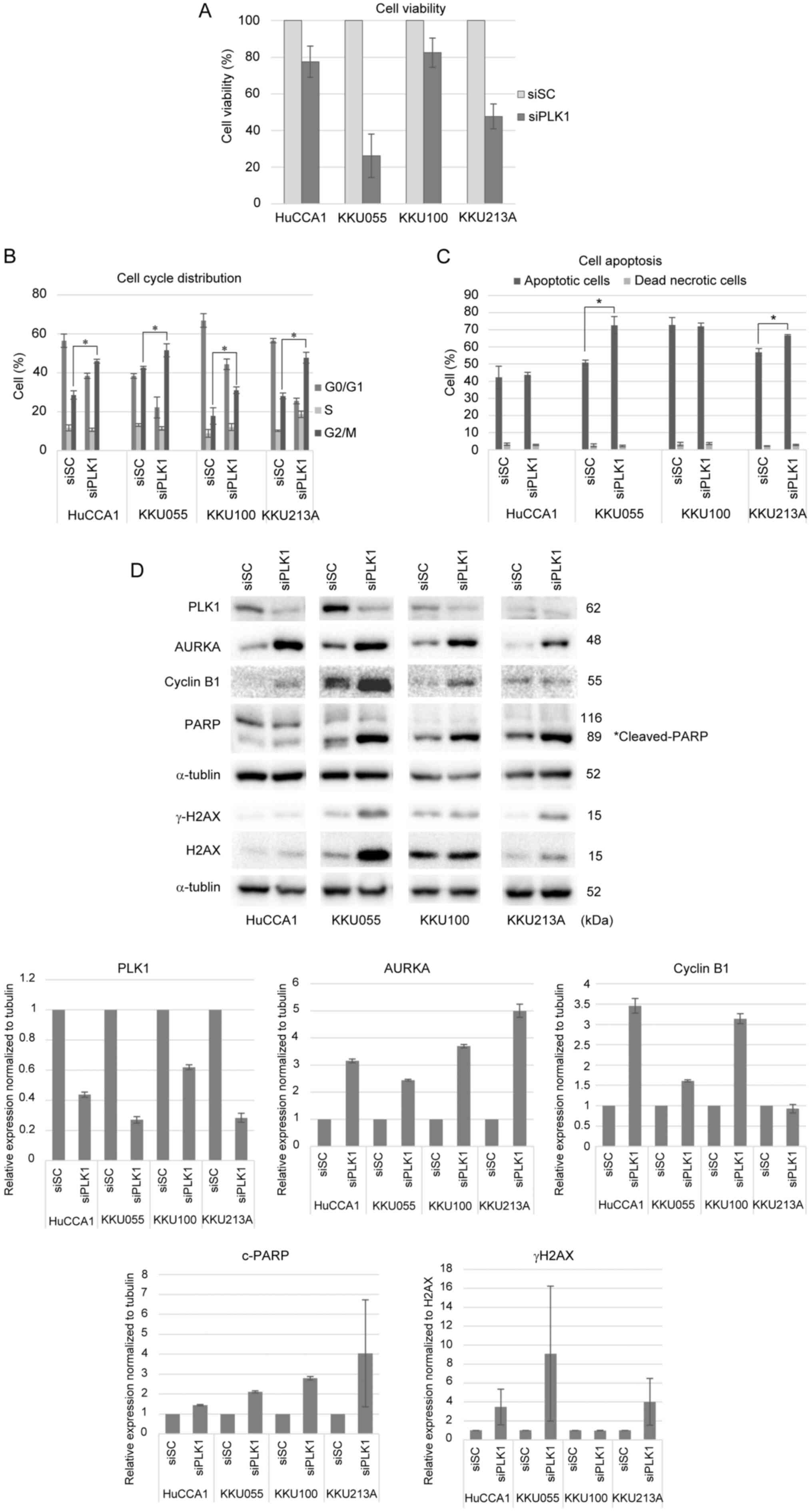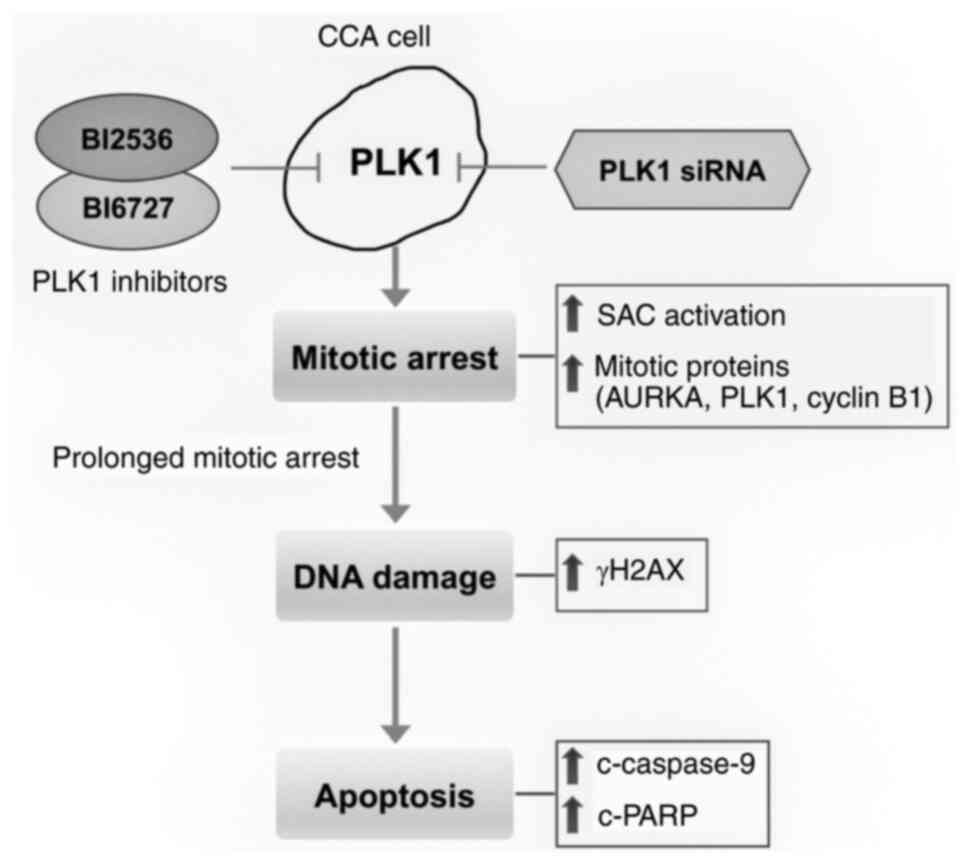|
1
|
Parkin DM, Ohshima H, Srivatanakul P and
Vatanasapt V: Cholangiocarcinoma: Epidemiology, mechanisms of
carcinogenesis and prevention. Cancer Epidemiol Biomarkers Prev.
2:537–544. 1993.PubMed/NCBI
|
|
2
|
Patel T: Worldwide trends in mortality
from biliary tract malignancies. BMC Cancer. 2:102002. View Article : Google Scholar : PubMed/NCBI
|
|
3
|
Shin HR, Oh JK, Masuyer E, Curado MP,
Bouvard V, Fang YY, Wiangnon S, Sripa B and Hong ST: Epidemiology
of cholangiocarcinoma: An update focusing on risk factors. Cancer
Sci. 101:579–585. 2010. View Article : Google Scholar : PubMed/NCBI
|
|
4
|
Gores GJ: Cholangiocarcinoma: Current
concepts and insights. Hepatology. 37:961–969. 2003. View Article : Google Scholar : PubMed/NCBI
|
|
5
|
Lazaridis KN and Gores GJ:
Cholangiocarcinoma. Gastroenterology. 128:1655–1667. 2005.
View Article : Google Scholar : PubMed/NCBI
|
|
6
|
Khan SA, Davidson BR, Goldin RD, Heaton N,
Karani J, Pereira SP, Rosenberg WM, Tait P, Taylor-Robinson SD,
Thillainayagam AV, et al: Guidelines for the diagnosis and
treatment of cholangiocarcinoma: An update. Gut. 61:1657–1669.
2012. View Article : Google Scholar : PubMed/NCBI
|
|
7
|
Friman S: Cholangiocarcinoma-current
treatment options. Scand J Surg. 100:30–34. 2011. View Article : Google Scholar : PubMed/NCBI
|
|
8
|
Hezel AF and Zhu AX: Systemic therapy for
biliary tract cancers. Oncologist. 13:415–423. 2008. View Article : Google Scholar : PubMed/NCBI
|
|
9
|
Eckel F and Schmid RM: Chemotherapy in
advanced biliary tract carcinoma: A pooled analysis of clinical
trials. Br J Cancer. 96:896–902. 2007. View Article : Google Scholar : PubMed/NCBI
|
|
10
|
Valle JW, Wasan H, Johnson P, Jones E,
Dixon L, Swindell R, Baka S, Maraveyas A, Corrie P, Falk S, et al:
Gemcitabine alone or in combination with cisplatin in patients with
advanced or metastatic cholangiocarcinomas or other biliary tract
tumours: A multicentre randomised phase II study-the UK ABC-01
study. Br J Cancer. 101:621–627. 2009. View Article : Google Scholar : PubMed/NCBI
|
|
11
|
Chaisaingmongkol J, Budhu A, Dang H,
Rabibhadana S, Pupacdi B, Kwon SM, Forgues M, Pomyen Y,
Bhudhisawasdi V, Lertprasertsuke N, et al: Common molecular
subtypes among asian hepatocellular carcinoma and
cholangiocarcinoma. Cancer Cell. 32:57–70.e53. 2017. View Article : Google Scholar : PubMed/NCBI
|
|
12
|
Iliaki S, Beyaert R and Afonina IS:
Polo-like kinase 1 (PLK1) signaling in cancer and beyond. Biochem
Pharmacol. 193:1147472021. View Article : Google Scholar : PubMed/NCBI
|
|
13
|
Weiß L and Efferth T: Polo-like kinase 1
as target for cancer therapy. Exp Hematol Oncol. 1:382012.
View Article : Google Scholar : PubMed/NCBI
|
|
14
|
Schmucker S and Sumara I: Molecular
dynamics of PLK1 during mitosis. Mol Cell Oncol. 1:e9545072014.
View Article : Google Scholar : PubMed/NCBI
|
|
15
|
Kumar S, Sharma AR, Sharma G, Chakraborty
C and Kim J: PLK-1: Angel or devil for cell cycle progression.
Biochim Biophys Acta. 1865:190–203. 2016.PubMed/NCBI
|
|
16
|
He ZL, Zheng H, Lin H, Miao XY and Zhong
DW: Overexpression of polo-like kinase1 predicts a poor prognosis
in hepatocellular carcinoma patients. World J Gastroenterol.
15:4177–4182. 2009. View Article : Google Scholar : PubMed/NCBI
|
|
17
|
Weichert W, Kristiansen G, Winzer KJ,
Schmidt M, Gekeler V, Noske A, Müller BM, Niesporek S, Dietel M and
Denkert C: Polo-like kinase isoforms in breast cancer: Expression
patterns and prognostic implications. Virchows Arch. 446:442–450.
2005. View Article : Google Scholar : PubMed/NCBI
|
|
18
|
Takahashi T, Sano B, Nagata T, Kato H,
Sugiyama Y, Kunieda K, Kimura M, Okano Y and Saji S: Polo-like
kinase 1 (PLK1) is overexpressed in primary colorectal cancers.
Cancer Sci. 94:148–152. 2003. View Article : Google Scholar : PubMed/NCBI
|
|
19
|
Jang YJ, Kim YS and Kim WH: Oncogenic
effect of Polo-like kinase 1 expression in human gastric
carcinomas. Int J Oncol. 29:589–594. 2006.PubMed/NCBI
|
|
20
|
Weichert W, Denkert C, Schmidt M, Gekeler
V, Wolf G, Köbel M, Dietel M and Hauptmann S: Polo-like kinase
isoform expression is a prognostic factor in ovarian carcinoma. Br
J Cancer. 90:815–821. 2004. View Article : Google Scholar : PubMed/NCBI
|
|
21
|
Gleixner KV, Ferenc V, Peter B, Gruze A,
Meyer RA, Hadzijusufovic E, Cerny-Reiterer S, Mayerhofer M, Pickl
WF, Sillaber C and Valent P: Polo-like kinase 1 (Plk1) as a novel
drug target in chronic myeloid leukemia: Overriding imatinib
resistance with the Plk1 inhibitor BI 2536. Cancer Res.
70:1513–1523. 2010. View Article : Google Scholar : PubMed/NCBI
|
|
22
|
Schöffski P: Polo-like kinase (PLK)
inhibitors in preclinical and early clinical development in
oncology. Oncologist. 14:559–570. 2009. View Article : Google Scholar : PubMed/NCBI
|
|
23
|
Liu X and Erikson RL: Polo-like kinase
(Plk)1 depletion induces apoptosis in cancer cells. Proc Natl Acad
Sci USA. 100:5789–5794. 2003. View Article : Google Scholar : PubMed/NCBI
|
|
24
|
Barr FA, Silljé HH and Nigg EA: Polo-like
kinases and the orchestration of cell division. Nat Rev Mol Cell
Biol. 5:429–440. 2004. View Article : Google Scholar : PubMed/NCBI
|
|
25
|
Steegmaier M, Hoffmann M, Baum A, Lénárt
P, Petronczki M, Krssák M, Gürtler U, Garin-Chesa P, Lieb S, Quant
J, et al: BI 2536, a potent and selective inhibitor of polo-like
kinase 1, inhibits tumor growth in vivo. Curr Biol. 17:316–322.
2007. View Article : Google Scholar : PubMed/NCBI
|
|
26
|
Lénárt P, Petronczki M, Steegmaier M, Di
Fiore B, Lipp JJ, Hoffmann M, Rettig WJ, Kraut N and Peters JM: The
small-molecule inhibitor BI 2536 reveals novel insights into
mitotic roles of polo-like kinase 1. Curr Biol. 17:304–315. 2007.
View Article : Google Scholar : PubMed/NCBI
|
|
27
|
Rudolph D, Steegmaier M, Hoffmann M,
Grauert M, Baum A, Quant J, Haslinger C, Garin-Chesa P and Adolf
GR: BI 6727, a Polo-like kinase inhibitor with improved
pharmacokinetic profile and broad antitumor activity. Clin Cancer
Res. 15:3094–3102. 2009. View Article : Google Scholar : PubMed/NCBI
|
|
28
|
Cheng CY, Liu CJ, Huang YC, Wu SH, Fang HW
and Chen YJ: BI2536 induces mitotic catastrophe and
radiosensitization in human oral cancer cells. Oncotarget.
9:21231–21243. 2018. View Article : Google Scholar : PubMed/NCBI
|
|
29
|
Schmit TL, Zhong W, Setaluri V, Spiegelman
VS and Ahmad N: Targeted depletion of Polo-like kinase (Plk) 1
through lentiviral shRNA or a small-molecule inhibitor causes
mitotic catastrophe and induction of apoptosis in human melanoma
cells. J Invest Dermatol. 129:2843–2853. 2009. View Article : Google Scholar : PubMed/NCBI
|
|
30
|
Chen E and Pei R: BI6727, a polo-like
kinase 1 inhibitor with promising efficacy on Burkitt lymphoma
cells. J Int Med Res. 48:3000605209260932020.PubMed/NCBI
|
|
31
|
Choi M, Kim W, Cheon MG, Lee CW and Kim
JE: Polo-like kinase 1 inhibitor BI2536 causes mitotic catastrophe
following activation of the spindle assembly checkpoint in
non-small cell lung cancer cells. Cancer Lett. 357:591–601. 2015.
View Article : Google Scholar : PubMed/NCBI
|
|
32
|
Thrum S, Lorenz J, Mössner J and Wiedmann
M: Polo-like kinase 1 inhibition as a new therapeutic modality in
therapy of cholangiocarcinoma. Anticancer Res. 31:3289–3299.
2011.PubMed/NCBI
|
|
33
|
Zhou Y, Xu L, Wang Z, Liu H, Zhang X, Shu
C, Zhang M, Wang T, Xu X, Pu X, et al: Sequentially targeting and
intervening mutual Polo-like Kinase 1 on CAFs and tumor cells by
dual targeting nano-platform for cholangiocarcinoma treatment.
Theranostics. 12:3911–3927. 2022. View Article : Google Scholar : PubMed/NCBI
|
|
34
|
Riantana H, Waenphimai O, Mahalapbutr P,
Karnchanapandh K, Vaeteewoottacharn K, Wongkham S and Sawanyawisuth
K: BI6727 and GSK461364A, potent PLK1 inhibitors induce G2/M arrest
and apoptosis against cholangiocarcinoma cell lines. Pathol Res
Pract. 248:1546782023. View Article : Google Scholar : PubMed/NCBI
|
|
35
|
Sirisinha S, Tengchaisri T, Boonpucknavig
S, Prempracha N, Ratanarapee S and Pausawasdi A: Establishment and
characterization of a cholangiocarcinoma cell line from a Thai
patient with intrahepatic bile duct cancer. Asian Pac J Allergy
Immunol. 9:153–157. 1991.PubMed/NCBI
|
|
36
|
Sripa B, Seubwai W, Vaeteewoottacharn K,
Sawanyawisuth K, Silsirivanit A, Kaewkong W, Muisuk K, Dana P,
Phoomak C, Lert-Itthiporn W, et al: Functional and genetic
characterization of three cell lines derived from a single tumor of
an Opisthorchis viverrini-associated cholangiocarcinoma
patient. Hum Cell. 33:695–708. 2020. View Article : Google Scholar : PubMed/NCBI
|
|
37
|
Tepsiri N, Chaturat L, Sripa B, Namwat W,
Wongkham S, Bhudhisawasdi V and Tassaneeyakul W: Drug sensitivity
and drug resistance profiles of human intrahepatic
cholangiocarcinoma cell lines. World J Gastroenterol. 11:2748–2753.
2005. View Article : Google Scholar : PubMed/NCBI
|
|
38
|
Sripa B, Leungwattanawanit S, Nitta T,
Wongkham C, Bhudhisawasdi V, Puapairoj A, Sripa C and Miwa M:
Establishment and characterization of an opisthorchiasis-associated
cholangiocarcinoma cell line (KKU-100). World J Gastroenterol.
11:3392–3397. 2005. View Article : Google Scholar : PubMed/NCBI
|
|
39
|
Fehling SC, Miller AL, Garcia PL, Vance RB
and Yoon KJ: The combination of BET and PARP inhibitors is
synergistic in models of cholangiocarcinoma. Cancer Lett.
468:48–58. 2020. View Article : Google Scholar : PubMed/NCBI
|
|
40
|
Uthaisar K, Vaeteewoottacharn K, Seubwai
W, Talabnin C, Sawanyawisuth K, Obchoei S, Kraiklang R, Okada S and
Wongkham S: Establishment and characterization of a novel human
cholangiocarcinoma cell line with high metastatic activity. Oncol
Rep. 36:1435–1446. 2016. View Article : Google Scholar : PubMed/NCBI
|
|
41
|
Jamnongsong S, Kueanjinda P, Buraphat P,
Sakornsakolpat P, Vaeteewoottacharn K, Okada S, Jirawatnotai S and
Sampattavanich S: Comprehensive drug response profiling and
pan-omic analysis identified therapeutic candidates and prognostic
biomarkers for Asian cholangiocarcinoma. iScience. 25:1051822022.
View Article : Google Scholar : PubMed/NCBI
|
|
42
|
Saensa-Ard S, Leuangwattanawanit S,
Senggunprai L, Namwat N, Kongpetch S, Chamgramol Y, Loilome W,
Khansaard W, Jusakul A, Prawan A, et al: Establishment of
cholangiocarcinoma cell lines from patients in the endemic area of
liver fluke infection in Thailand. Tumour Biol.
39:10104283177259252017. View Article : Google Scholar : PubMed/NCBI
|
|
43
|
Lau DK, Mouradov D, Wasenang W, Luk IY,
Scott CM, Williams DS, Yeung YH, Limpaiboon T, Iatropoulos GF,
Jenkins LJ, et al: Genomic profiling of biliary tract cancer cell
lines reveals molecular subtypes and actionable drug targets.
iScience. 21:624–637. 2019. View Article : Google Scholar : PubMed/NCBI
|
|
44
|
Schmittgen TD and Livak KJ: Analyzing
real-time PCR data by the comparative C(T) method. Nat Protoc.
3:1101–1108. 2008. View Article : Google Scholar : PubMed/NCBI
|
|
45
|
Driscoll DL, Chakravarty A, Bowman D,
Shinde V, Lasky K, Shi J, Vos T, Stringer B, Amidon B, D'Amore N
and Hyer ML: Plk1 inhibition causes post-mitotic DNA damage and
senescence in a range of human tumor cell lines. PLoS One.
9:e1110602014. View Article : Google Scholar : PubMed/NCBI
|
|
46
|
Pezuk JA, Brassesco MS, Morales AG, de
Oliveira JC, de Paula Queiroz RG, Machado HR, Carlotti CG Jr, Neder
L, Scrideli CA and Tone LG: Polo-like kinase 1 inhibition causes
decreased proliferation by cell cycle arrest, leading to cell death
in glioblastoma. Cancer Gene Ther. 20:499–506. 2013. View Article : Google Scholar : PubMed/NCBI
|
|
47
|
Xie FF, Pan SS, Ou RY, Zheng ZZ, Huang XX,
Jian MT, Qiu JG, Zhang WJ, Jiang QW, Yang Y, et al: Volasertib
suppresses tumor growth and potentiates the activity of cisplatin
in cervical cancer. Am J Cancer Res. 5:3548–3559. 2015.PubMed/NCBI
|
|
48
|
Lu B, Mahmud H, Maass AH, Yu B, van Gilst
WH, de Boer RA and Silljé HH: The Plk1 inhibitor BI 2536
temporarily arrests primary cardiac fibroblasts in mitosis and
generates aneuploidy in vitro. PLoS One. 5:e129632010. View Article : Google Scholar : PubMed/NCBI
|
|
49
|
Shiloh Y: ATM and related protein kinases:
Safeguarding genome integrity. Nat Rev Cancer. 3:155–168. 2003.
View Article : Google Scholar : PubMed/NCBI
|
|
50
|
Herceg Z and Wang ZQ: Failure of
poly(ADP-ribose) polymerase cleavage by caspases leads to induction
of necrosis and enhanced apoptosis. Mol Cell Biol. 19:5124–5133.
1999. View Article : Google Scholar : PubMed/NCBI
|
|
51
|
Sinha D, Duijf PHG and Khanna KK: Mitotic
slippage: An old tale with a new twist. Cell Cycle. 18:7–15. 2019.
View Article : Google Scholar : PubMed/NCBI
|
|
52
|
Ahonen LJ, Kallio MJ, Daum JR, Bolton M,
Manke IA, Yaffe MB, Stukenberg PT and Gorbsky GJ: Polo-like kinase
1 creates the tension-sensing 3F3/2 phosphoepitope and modulates
the association of spindle-checkpoint proteins at kinetochores.
Curr Biol. 15:1078–1089. 2005. View Article : Google Scholar : PubMed/NCBI
|
|
53
|
Sanhaji M, Kreis NN, Zimmer B, Berg T,
Louwen F and Yuan J: p53 is not directly relevant to the response
of Polo-like kinase 1 inhibitors. Cell Cycle. 11:543–553. 2012.
View Article : Google Scholar : PubMed/NCBI
|
|
54
|
D'Angiolella V, Mari C, Nocera D, Rametti
L and Grieco D: The spindle checkpoint requires cyclin-dependent
kinase activity. Genes Dev. 17:2520–2525. 2003. View Article : Google Scholar : PubMed/NCBI
|
|
55
|
Penna LS, Henriques JAP and Bonatto D:
Anti-mitotic agents: Are they emerging molecules for cancer
treatment? Pharmacol Ther. 173:67–82. 2017. View Article : Google Scholar : PubMed/NCBI
|
|
56
|
Macůrek L, Lindqvist A, Lim D, Lampson MA,
Klompmaker R, Freire R, Clouin C, Taylor SS, Yaffe MB and Medema
RH: Polo-like kinase-1 is activated by aurora A to promote
checkpoint recovery. Nature. 455:119–123. 2008. View Article : Google Scholar : PubMed/NCBI
|
|
57
|
Mancini M, De Santis S, Monaldi C,
Castagnetti F, Lonetti A, Bruno S, Dan E, Sinigaglia B, Rosti G,
Cavo M, et al: Polo-like kinase-1, Aurora kinase A and WEE1 kinase
are promising druggable targets in CML cells displaying
BCR::ABL1-independent resistance to tyrosine kinase inhibitors.
Front Oncol. 12:9011322022. View Article : Google Scholar : PubMed/NCBI
|
|
58
|
Jang YJ, Ji JH, Choi YC, Ryu CJ and Ko SY:
Regulation of Polo-like kinase 1 by DNA damage in mitosis.
Inhibition of mitotic PLK-1 by protein phosphatase 2A. J Biol Chem.
282:2473–2482. 2007. View Article : Google Scholar : PubMed/NCBI
|
|
59
|
Hyun SY, Hwang HI and Jang YJ: Polo-like
kinase-1 in DNA damage response. BMB Rep. 47:249–255. 2014.
View Article : Google Scholar : PubMed/NCBI
|
|
60
|
Tsvetkov L, Xu X, Li J and Stern DF:
Polo-like kinase 1 and Chk2 interact and co-localize to centrosomes
and the midbody. J Biol Chem. 278:8468–8475. 2003. View Article : Google Scholar : PubMed/NCBI
|
|
61
|
Ando K, Ozaki T, Yamamoto H, Furuya K,
Hosoda M, Hayashi S, Fukuzawa M and Nakagawara A: Polo-like kinase
1 (Plk1) inhibits p53 function by physical interaction and
phosphorylation. J Biol Chem. 279:25549–25561. 2004. View Article : Google Scholar : PubMed/NCBI
|
|
62
|
Tamura Y, Simizu S, Muroi M, Takagi S,
Kawatani M, Watanabe N and Osada H: Polo-like kinase 1
phosphorylates and regulates Bcl-x(L) during pironetin-induced
apoptosis. Oncogene. 28:107–116. 2009. View Article : Google Scholar : PubMed/NCBI
|
|
63
|
Liu X, Lei M and Erikson RL: Normal cells,
but not cancer cells, survive severe Plk1 depletion. Mol Cell Biol.
26:2093–2108. 2006. View Article : Google Scholar : PubMed/NCBI
|
|
64
|
Sebastian M, Reck M, Waller CF, Kortsik C,
Frickhofen N, Schuler M, Fritsch H, Gaschler-Markefski B, Hanft G,
Munzert G and von Pawel J: The efficacy and safety of BI 2536, a
novel Plk-1 inhibitor, in patients with stage IIIB/IV non-small
cell lung cancer who had relapsed after, or failed, chemotherapy:
Results from an open-label, randomized phase II clinical trial. J
Thorac Oncol. 5:1060–1067. 2010. View Article : Google Scholar : PubMed/NCBI
|
|
65
|
Ellis PM, Chu QS, Leighl N, Laurie SA,
Fritsch H, Gaschler-Markefski B, Gyorffy S and Munzert G: A phase I
open-label dose-escalation study of intravenous BI 2536 together
with pemetrexed in previously treated patients with non-small-cell
lung cancer. Clin Lung Cancer. 14:19–27. 2013. View Article : Google Scholar : PubMed/NCBI
|
|
66
|
Cortes J, Podoltsev N, Kantarjian H,
Borthakur G, Zeidan AM, Stahl M, Taube T, Fagan N, Rajeswari S and
Uy GL: Phase 1 dose escalation trial of volasertib in combination
with decitabine in patients with acute myeloid leukemia. Int J
Hematol. 113:92–99. 2021. View Article : Google Scholar : PubMed/NCBI
|















